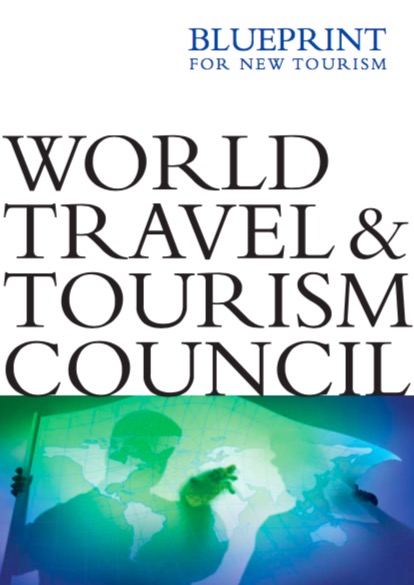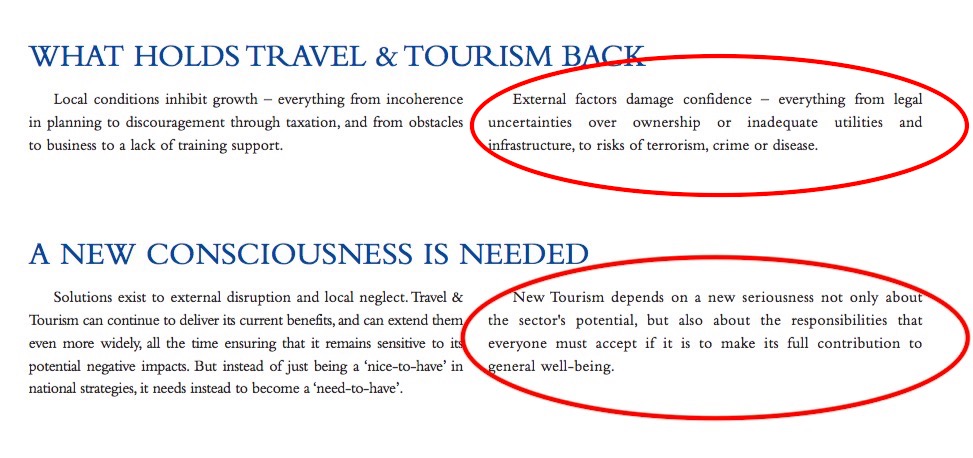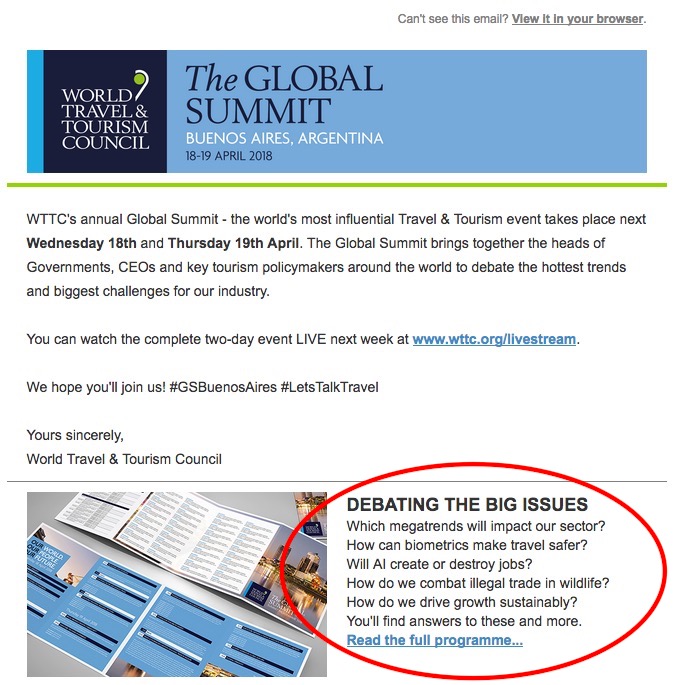19 Apr 2018
WTTC’s Mission Still Not Accomplished
In September 2003, exactly 15 years ago, the World Travel & Tourism Council issued a Blueprint for New Tourism. It was yet another assertion of the WTTC mantras flagged since the formation of the rich mans’ club in 1991 — make T&T a priority, liberalise travel, open markets and remove impediments.

These mantras have produced spectacular success. Thanks to that Blueprint and many other WTTC reports, just about every government has made tourism a priority in some shape or form. If simply numerical growth is the criteria, tourism could be considered the most successful industry on the planet, after weapons and armaments. The mantras were reiterated in the WTTC’s numerous events in and reports on China, and contributed significantly to the Chinese inbound-outbound tourism boom. Ditto, the WTTC’s impact on India and the ASEAN countries. Today, the cup of success is brimming over, into the realm of over-tourism.
However, revisiting the finer points of that WTTC Blueprint indicates that the dream, mission and vision is still not accomplished. Two points are more relevant than ever, especially for the WTTC summit starting in Argentina on April 18.

Note the references to 1) a “new consciousness” and “external factors which damage confidence”; and 2) “responsibilities that everyone must accept.”
There is an even chance that no one at the WTTC today knows of this report’s existence. That is the value journalists-cum-historians such as myself deliver to this industry. Our job is to remind the new generation of its successes and failures, and to help them learn from the lessons of history.
Take for example the reference to “external factors which damage confidence.” The blueprint was issued in September 2003, just a few months after the U.S.-led “coalition of the willing” attacked Iraq in pursuit of weapons of mass destruction that proved to be non-existent. Does that conflict, as well as those which followed in other countries of the Middle East and North Africa, qualify as “external factors” that have damaged confidence in travel & tourism and inhibited its real growth potential? Had those conflicts been avoided, and an Israeli-Palestinian peace accord worked out instead, where would global tourism be today?
The second reference, linked to the first, is “responsibilities that everyone must accept if it is to make its full contribution to general well-being.” Does “everyone” include the WTTC members themselves? As powerful, well-connected and highly influential corporations, what responsibility should WTTC members accept for alleviating the external factors that are impacting tourism, including wars and conflict?
In analysing their own activities over the past 15 years since that Blueprint, have the WTTC members only focussed on generating tourism growth and lining their own corporate pockets, or have they seriously pursued, in the language of their own blueprint a “new consciousness?”
Last year, the WTTC summit was in Bangkok. It was devoid of any “new consciousness”. The keynote speaker, former British Prime Minister David Cameron, pocketed US$250,000 of Thai taxpayers money to deliver one of the worst and most forgettable keynote speeches I have ever heard. The Argentina summit also appears to be focussed on the same preaching-to-the-converted parochialism dominating travel industry summits. The “Big Issues” posed in the marketing pitches are simplistic beyond belief. For example:

Here are some simple answers.
How can biometrics make travel safer? It won’t. It will only line the pockets of those selling biometrics. Those who have a burning reason to kill will always find targets.
Will AI create or destroy jobs? Both. It’s like any transition process which is the (hi)story of life. Jobs in the old way of doing things will make way for new jobs. So what?
How do we combat illegal trade in wildlife? Punish the buyers and consumers, as well as the smugglers and traders. If demand is snuffed, supply will follow. Failing that, declare the smugglers terrorists and blast them with Tomahawk missiles.
How do we drive growth sustainably? Try adopting the Sufficiency Economy philosophy of Thailand’s late King Bhumibhol Adulyadej or the Gross National Happiness philosophy of the late King of Bhutan or the Grameen Bank business model of Bangladeshi Nobel Prize winner, Muhammad Yunus.
Perhaps the most relevant question is “Which megatrends will impact our sector?” That may perhaps take a little more introspection, and generate some alternative questions for the WTTC big-wigs to ponder, such as:
(+) What can we do to meet the UN Sustainable Development Goals, especially to reduce the rich-poor income gap?
(+) What is our scorecard in building peace, friendship, communal harmony and reducing socio-cultural threats such as a clash of civilisations?
(+) How can we attend the trust deficit in global leadership, including those of multinational corporations?
(+) How can we alleviate corruption and promote human rights, democracy and accountability?
(+) Can we re-direct the money stashed away in tax havens to build schools, hospitals and water canals in impoverished regions of the world?
(+) Many WTTC members are American companies. What are they doing to stop their government from taking actions that cause global disruption and dystopia and make it unsafe for tourism?
(+) Many WTTC members are Jewish-owned companies. As they are making really good money in the Islamic countries, what are they doing to combat Islamophobia? How can they facilitate a fair, just and balanced peace in the Middle East?
Everything I have read about the Argentina summit so far indicates that the WTTC will be singing the same tunes it has since 1991.
The latest WTTC media release says its President and CEO Gloria Guevara will emphasise the strategic importance of the Travel & Tourism sector to the global economy. Like all her predecessors, she will roll out more statistics on Travel & Tourism’s contribution to jobs, exports and prosperity. She will ask how the industry is responding to a changing world where the future of work is impacted by technology, artificial intelligence, machine learning and new business models. She will seek a specific focus on three priority areas as identified by WTTC Members: security and travel facilitation, crisis preparedness and management, and sustainable growth.
As one of the few travel trade journalists to have covered the WTTC ever since its formation, I can confidently assert that the WTTC’s agenda itself is in serious need of disruption. It is a monumental joke for the WTTC to ask how the industry is responding to a changing world when the WTTC itself has not changed its own agenda in response to a changing world. Security, travel facilitation, crisis preparedness and sustainable growth are all geopolitical issues that have steadily worsened since 2003. The WTTC has chosen to continue addressing their symptoms while ignoring the cause. That is not in line with the “responsibilities that everyone must accept”.
The WTTC’s continued head-in-the-sand attitude can easily be proved. The 2003 Blueprint for a New Tourism was issued just a few weeks after the Lie-of-the-Century attack on Iraq. Today, 15 years later, the Argentina summit is taking place right after another attack on Syria. There is no indication that the WTTC members care. Their focus has shifted to Latin America and Africa, the new kids on the travel & tourism bloc.
So much for “new consciousness”. Mission accomplished? Not by a long shot.
